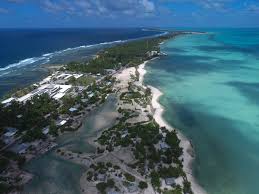
Introduction
Kiribati, a small Pacific Island nation, has found itself at the center of global geopolitics as its leader, President Taneti Maamau, faces a critical election test. The nation’s pivot towards China, under Maamau’s leadership, has drawn both domestic and international attention. As the election looms, the political climate in Kiribati is tense, with significant implications for the island nation’s future and its role on the global stage.
Table of Contents
The Political Landscape in Kiribati
Kiribati, an archipelago of 33 atolls and reef islands, is strategically located in the central Pacific Ocean. It has a population of just over 100,000 people. The country’s political landscape has traditionally been shaped by issues such as climate change, economic development, and infrastructure. However, in recent years, foreign policy—particularly the relationship with China—has become a dominant issue.
President Taneti Maamau’s Leadership
Taneti Maamau has been the President of Kiribati since 2016. Initially, he maintained the country’s long-standing diplomatic ties with Taiwan. However, in 2019, Maamau made the controversial decision to switch diplomatic recognition from Taiwan to China. This move aligned Kiribati with Beijing’s One-China policy and opened the door to significant Chinese investment in the country.
Maamau’s decision was met with mixed reactions. Supporters argue that the switch has brought much-needed development aid and investment to Kiribati. Chinese-funded projects, including infrastructure development, have visibly improved the country’s landscape. However, critics are concerned about the long-term implications of closer ties with China, fearing that Kiribati’s sovereignty and independence could be compromised.
The Opposition’s Stance
The opposition in Kiribati, led by the Boutokaan te Koaua (BTK) party, has made Maamau’s pro-China stance a central issue in the election. The BTK party argues that the switch from Taiwan to China was made without sufficient public consultation and has raised concerns about transparency and accountability in the government’s dealings with Beijing.
Opposition leaders have also highlighted the potential risks associated with Kiribati’s growing reliance on Chinese aid. They have pointed to instances in other countries where Chinese investment has led to debt dependency and loss of control over critical infrastructure. The BTK party is advocating for a re-evaluation of Kiribati’s foreign policy and a more balanced approach to international relations.
The Election as a Referendum on Foreign Policy
The upcoming election in Kiribati is being widely viewed as a referendum on the country’s foreign policy direction. For many voters, the choice between Maamau and his challengers represents a broader decision about Kiribati’s place in the world and its relationships with global powers.
The Role of China in Kiribati’s Development
China’s influence in Kiribati has grown significantly since the diplomatic switch in 2019. Chinese investment has been directed towards a range of projects, including road construction, housing developments, and fisheries. Beijing has also provided medical aid and scholarships for Kiribati students to study in China.
Proponents of closer ties with China argue that these investments are crucial for Kiribati’s development, particularly as the country grapples with the effects of climate change and rising sea levels. They believe that China offers a reliable partner that can help Kiribati build the infrastructure it needs to thrive in the 21st century.
Concerns About Sovereignty and Independence
However, concerns about the impact of Chinese influence on Kiribati’s sovereignty have been raised by opposition politicians, civil society groups, and some international observers. Critics worry that Kiribati could become overly dependent on China, leading to a loss of control over key aspects of the nation’s governance and economy.
There are also fears that Kiribati’s strategic location in the Pacific could be exploited by China for military or geopolitical purposes. The United States and its allies have expressed concerns about China’s growing presence in the region and its potential implications for regional security.
The Regional and Global Implications
The outcome of the election in Kiribati will have significant implications not only for the country itself but also for the broader Pacific region and the international community. As China and the United States vie for influence in the Pacific, Kiribati’s foreign policy choices will be closely watched by both superpowers.
The Pacific as a Geopolitical Battleground
The Pacific region has become a focal point of geopolitical competition between China and the United States. Kiribati, along with other Pacific Island nations, has found itself at the center of this competition. The region’s strategic importance has led to increased diplomatic and economic engagement from both Beijing and Washington.
For China, maintaining strong ties with Kiribati is part of its broader strategy to expand its influence in the Pacific. For the United States and its allies, ensuring that Pacific Island nations maintain their independence and resist Chinese pressure is a key priority.

The Impact on Regional Stability
The election in Kiribati could have a ripple effect on regional stability. If Maamau is re-elected, it could signal a continuation of the country’s close relationship with China, potentially leading to increased tension in the region. On the other hand, a victory for the opposition could result in a shift away from Beijing, which could have implications for Chinese investment and influence in the Pacific.
The outcome of the election could also influence the foreign policy decisions of other Pacific Island nations, many of which are grappling with similar issues related to Chinese investment and influence.
Conclusion
The upcoming election in Kiribati is more than just a domestic political contest; it is a critical juncture in the country’s history. The choice between continuing on the path of close relations with China or pursuing a more balanced foreign policy will have far-reaching implications for Kiribati’s future. As the nation prepares to vote, the world will be watching closely, aware that the results could shape the geopolitical landscape of the Pacific for years to come.







